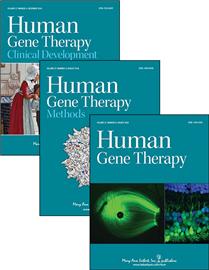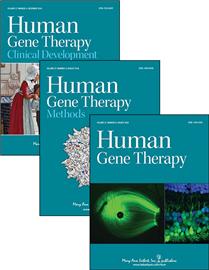
Credit: Mary Ann Liebert, Inc., publishers
New Rochelle, NY, June 6, 2017–Based on the encouraging safety data that has emerged from multiple clinical trials that used different gene transfer approaches to improve heart function in patients suffering from heart failure with reduced ejection fraction, researchers conclude that this therapeutic strategy can be advanced with acceptable risk. They review the results of completed clinical studies and identify the current challenges in an article published in Human Gene Therapy, a peer-reviewed journal from Mary Ann Liebert, Inc., publishers. The article is available open access on the Human Gene Therapy website.
In the article entitled "Randomized Clinical Trials of Gene Transfer for Heart Failure with Reduced Ejection Fraction," William Penny and H. Kirk Hammond, VA San Diego Healthcare System and University of California, San Diego, describe the different genes delivered to the patients and their intended effects, and the two gene delivery methods used in the clinical trials — injection of a virus vector into the heart muscle or delivery of a plasmid to the endocardium, the membrane lining the chambers of the heart. Despite a promising safety profile for gene transfer in these patients, these early studies yielded mixed results in terms of efficacy, necessitating further development and testing.
"Complex multifactorial diseases like congestive heart failure represent the greatest challenge faced by clinical gene therapy scientists. There is no substitute for large-scale randomized clinical trials in the advancement of the field," says Editor-in-Chief Terence R. Flotte, MD, Celia and Isaac Haidak Professor of Medical Education and Dean, Provost, and Executive Deputy Chancellor, University of Massachusetts Medical School, Worcester, MA.
###
Research reported in this publication was supported by the National Institutes of Health under Award Numbers P01-HL66941 and R42-HL122038. The content is solely the responsibility of the authors and does not necessarily represent the official views of the National Institutes of Health.
About the Journal
Human Gene Therapy, the Official Journal of the European Society of Gene and Cell Therapy, British Society for Gene and Cell Therapy, French Society of Cell and Gene Therapy, German Society of Gene Therapy, and five other gene therapy societies, is an authoritative peer-reviewed journal published monthly in print and online. Led by Editor-in-Chief Terence R. Flotte, MD, Celia and Isaac Haidak Professor of Medical Education and Dean, Provost, and Executive Deputy Chancellor, University of Massachusetts Medical School, Human Gene Therapy presents reports on the transfer and expression of genes in mammals, including humans. Related topics include improvements in vector development, delivery systems, and animal models, particularly in the areas of cancer, heart disease, viral disease, genetic disease, and neurological disease, as well as ethical, legal, and regulatory issues related to the gene transfer in humans. Its companion journals, Human Gene Therapy Methods, published bimonthly, focuses on the application of gene therapy to product testing and development, and Human Gene Therapy Clinical Development, published quarterly, features data relevant to the regulatory review and commercial development of cell and gene therapy products. Tables of contents for all three publications and a free sample issue may be viewed on the Human Gene Therapy website.
About the Publisher
Mary Ann Liebert, Inc., publishers is a privately held, fully integrated media company known for establishing authoritative peer-reviewed journals in many promising areas of science and biomedical research, including Nucleic Acid Therapeutics, Tissue Engineering, Stem Cells and Development, and Cellular Reprogramming. Its biotechnology trade magazine, GEN (Genetic Engineering & Biotechnology News), was the first in its field and is today the industry's most widely read publication worldwide. A complete list of the firm's 80 journals, books, and newsmagazines is available on the Mary Ann Liebert, Inc., publishers website.
Mary Ann Liebert, Inc. 140 Huguenot St., New Rochelle, NY 10801-5215 http://www.liebertpub.com Phone: (914) 740-2100 (800) M-LIEBERT Fax: (914) 740-2101
Media Contact
Kathryn Ryan
[email protected]
914-740-2250
@LiebertPub
http://www.liebertpub.com
Original Source
http://www.liebertpub.com/global/pressrelease/safety-of-gene-transfer-to-treat-heart-failure-supports-further-clinical-development/2186/ http://dx.doi.org/10.1089/hum.2016.166
############
Story Source: Materials provided by Scienmag





